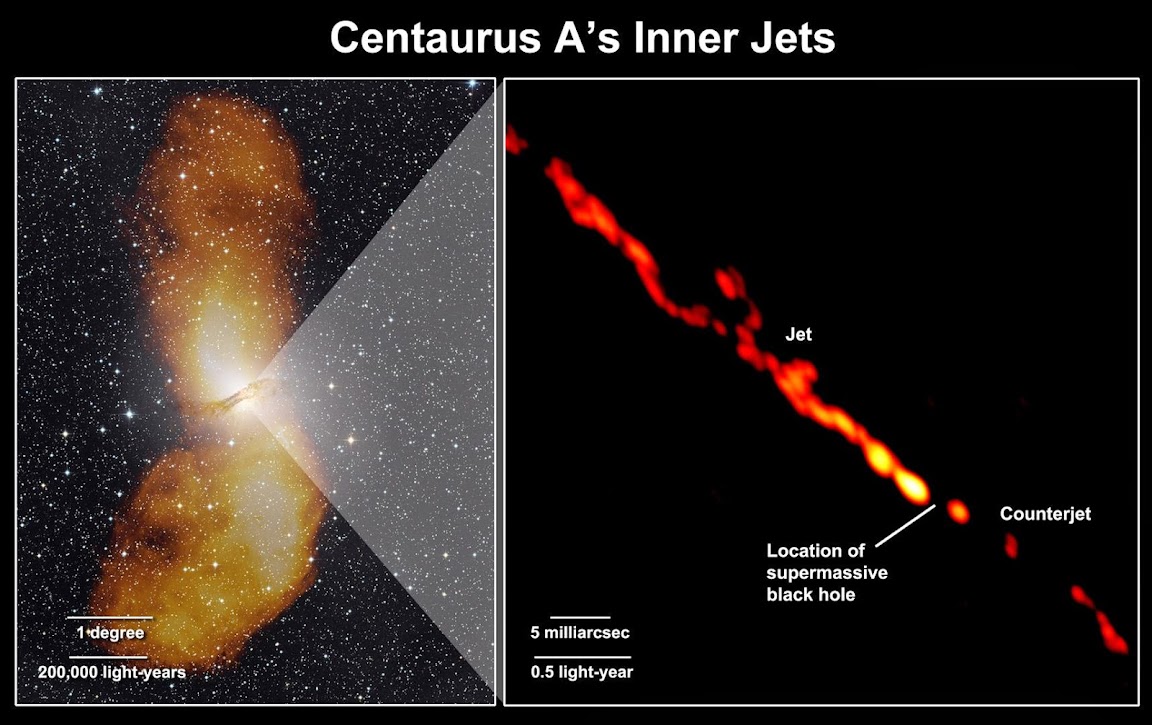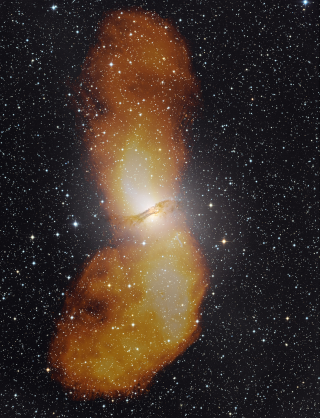Page 1 of 1
APOD: Peculiar Elliptical Galaxy Centaurus A (2014 Jun 30)
Posted: Mon Jun 30, 2014 4:10 am
by APOD Robot
 Peculiar Elliptical Galaxy Centaurus A
Explanation:
Peculiar Elliptical Galaxy Centaurus A
Explanation: What's happened to the center of this galaxy? Unusual and dramatic
dust lanes run across the center of elliptical galaxy
Centaurus A. These dust lanes are so thick they almost completely obscure the
galaxy's center in
visible light. This is particularly unusual as
Cen A's red stars and round shape are characteristic of a giant
elliptical galaxy, a galaxy type usually low in dark dust.
Cen A, also known as NGC 5128, is also unusual compared to an average
elliptical galaxy because it contains a higher proportion of young blue stars and is a
very strong source of
radio emission. Evidence indicates that
Cen A is likely the result of the
collision of two
normal galaxies. During the collision, many
young stars were formed, but
details of the creation of Cen A's unusual dust belts are still being researched.
Cen A lies only 13 million
light years away, making it the closest
active galaxy. Cen A,
pictured above, spans 60,000 light years and can be seen with binoculars toward the
constellation of
Centaurus.
[/b]
Re: APOD: Peculiar Elliptical Galaxy Centaurus A (2014 Jun 3
Posted: Mon Jun 30, 2014 12:45 pm
by nealmcb
I would love to see the enormous radio lobes from Cen A in the context of the visible night sky.
There is a great image suggesting how big they are here:
CSIRO astronomers reveal a ‘blue whale of space’ | CSIRO

but that image uses radio sources as the background.
Can anyone take e.g. the FIPS data from that paper (which should be available now) and compose them with a nice wide-angle visible star field view?
Re: APOD: Peculiar Elliptical Galaxy Centaurus A (2014 Jun 3
Posted: Mon Jun 30, 2014 3:24 pm
by Ron-Astro Pharmacist
Talk about multiple personalities. Centaurus A shows off its diversity across the entire electro-magnetic spectrum. The jet and counterjet seem to twist almost as if leaving a diffuse contrail as it moves through space mimicking the S-shape of the dust lanes at 90 °.
It's amazing what you see at 13 million light years from within a couple of six inch hemispheres "with a little help from your lens".

Today's image is almost as convoluted and has much more interesting lobes.

Re: APOD: Peculiar Elliptical Galaxy Centaurus A (2014 Jun 3
Posted: Mon Jun 30, 2014 3:44 pm
by geckzilla
nealmcb wrote:Can anyone take e.g. the FIPS data from that paper (which should be available now) and compose them with a nice wide-angle visible star field view?
Could if I had any idea how. The last time I tried to get some radio data I just got completely confused.
Re: APOD: Peculiar Elliptical Galaxy Centaurus A (2014 Jun 3
Posted: Mon Jun 30, 2014 5:26 pm
by hlwelborn
I wish I had a radio telescope in my backyard.

Re: APOD: Peculiar Elliptical Galaxy Centaurus A (2014 Jun 3
Posted: Mon Jun 30, 2014 6:38 pm
by Chris Peterson
hlwelborn wrote:I wish I had a radio telescope in my backyard. :roll:
Build one. You don't need much to detect Cen A.
Re: APOD: Peculiar Elliptical Galaxy Centaurus A (2014 Jun 3
Posted: Mon Jun 30, 2014 6:50 pm
by hlwelborn
You mean like this?
http://www.mikebrownsplanets.com/2013/0 ... pe-at.html
I wonder if the bigs ones are ever available for salvage....hmmm...I'll look into it.
Thanks for the inspiration.
Re: APOD: Peculiar Elliptical Galaxy Centaurus A (2014 Jun 3
Posted: Mon Jun 30, 2014 7:14 pm
by neufer
Chris Peterson wrote:hlwelborn wrote:
I wish I had a radio telescope in my backyard.

Build one. You don't need much to detect Cen A.
Hlwelborn would need to travel south from the Pacific Northwest.
Re: APOD: Peculiar Elliptical Galaxy Centaurus A (2014 Jun 3
Posted: Mon Jun 30, 2014 7:17 pm
by starsurfer
It would be so cool if the radio jets also had an optical Ha counterpart like the ones associated with M82.
The other really cool thing about this galaxy is its extensive system of shells, which were discovered by David Malin in 1980. Their discovery was a result of the at the time new procedure of photographic amplification and led to the discovery of shells around many elliptical galaxies.
The shells of Centaurus A can superbly be seen in this
120 hour exposure image by the Australian amateur astrophotographer Rolf Olsen.
Another galaxy similar to Centaurus A that has outer shells and a dust lane is the southern galaxy NGC 7070A in the constellation of Grus.
One of the earliest shell ellipticals to be identified after Centaurus A is NGC 1344. A rare
image by Don Goldman.
Re: APOD: Peculiar Elliptical Galaxy Centaurus A (2014 Jun 3
Posted: Mon Jun 30, 2014 11:52 pm
by Nitpicker
starsurfer wrote:
The shells of Centaurus A can superbly be seen in this 120 hour exposure image by the Australian amateur astrophotographer Rolf Olsen.
In case Rolf Olsen is sensitive about it, I'll point out that he is not Australian. (Not a good day to be an Australian Rolf.)
http://www.rolfolsenastrophotography.com/About-me/
I grew up in Denmark but emigrated to New Zealand in 2003
Re: APOD: Peculiar Elliptical Galaxy Centaurus A (2014 Jun 3
Posted: Tue Jul 01, 2014 1:29 am
by NGC3314
starsurfer wrote:It would be so cool if the radio jets also had an optical Ha counterpart like the ones associated with M82.
They sort of kind of do - there is a long and complex train of emission-line filaments and blobs along one edge of the northeastern jet. Here is a pseudocolor montage of H-alpha images, rotated to follow the jet axis:
Latest results seem to be that this isn't the jet itself, but gas in Centaurus A which is shocked into emission by the passage of the jet (and maybe subsequent further cooling). There are suspicious sets of young stars in this region, good evidence that radio jets can in some circumstances trigger star formation even if we don't know the processes well.
The other attached image shows the H-alpha jet in a wider context so you can see where it fits against the galaxy and foreground stars, this time with north at the top. (This was from 10 hours of exposure with a 60-cm remotely operated instrument in Chile; there are additional faint wisps outside this area).
Re: APOD: Peculiar Elliptical Galaxy Centaurus A (2014 Jun 3
Posted: Tue Jul 01, 2014 1:33 am
by Boomer12k
From the image of Rolf's Photo...I am going with MERGER....you get SHELLS and Shock-wave like things from that....
Too bad it is below the horizon for me....but then....the HOUSE and trees would be in the way....I could not see Saturn last night because of trees in front of the house, and Mars only after a little while.
Last night was the first time I have been out this year. Might go out again tonight.
Last night saw:
Mars
Arcturus
M51
M57
M13
M63
Took Dark Frames for better pictures, but that is about it, so far....
and if it were not for "OFF", would have been eaten alive by Mosquitoes....but I don't seem to have any bites. YAY!!!!

Clear Skies!!!!
:---[===] *
Re: APOD: Peculiar Elliptical Galaxy Centaurus A (2014 Jun 3
Posted: Tue Jul 01, 2014 5:50 am
by LocalColor
Lots of lovely images in the links.
Clear sky tonight in Central Idaho - scope on!
Re: APOD: Peculiar Elliptical Galaxy Centaurus A (2014 Jun 3
Posted: Tue Jul 01, 2014 6:20 am
by alter-ego
nealmcb wrote:
... Can anyone take e.g. the FIPS data from that paper (which should be available now) and compose them with a nice wide-angle visible star field view?
A few years ago, a NASA posting attempted such a composite but they blew the opto/radio image scaling (wrt the left-panel's labeled radio scaling, the optical is about 8x too big). These images are below.
I've made a pretty nice simulated wide-angle composite using Stellarium and a partially transparent CSIRO image. Note, the size of Cen A, including Rolf Olsen's detailed shell structure, is ~½°. This to small to be revealed in the view below. Mainly the image shows the size of the radio emission within a wide-angle optical star field. The image below covers ~26°x 41°, north is up, and the displayed stars reach ~12th magnitude.
That's Omega Centauri just below the radio emission. I never realized the proximity of the globular to the radio jets until now.
Re: APOD: Peculiar Elliptical Galaxy Centaurus A (2014 Jun 3
Posted: Tue Jul 01, 2014 6:21 pm
by starsurfer
Nitpicker wrote:starsurfer wrote:
The shells of Centaurus A can superbly be seen in this 120 hour exposure image by the Australian amateur astrophotographer Rolf Olsen.
In case Rolf Olsen is sensitive about it, I'll point out that he is not Australian. (Not a good day to be an Australian Rolf.)
http://www.rolfolsenastrophotography.com/About-me/
I grew up in Denmark but emigrated to New Zealand in 2003
Oops!

Re: APOD: Peculiar Elliptical Galaxy Centaurus A (2014 Jun 3
Posted: Tue Jul 01, 2014 6:24 pm
by starsurfer
NGC3314 wrote:starsurfer wrote:It would be so cool if the radio jets also had an optical Ha counterpart like the ones associated with M82.
They sort of kind of do - there is a long and complex train of emission-line filaments and blobs along one edge of the northeastern jet. Here is a pseudocolor montage of H-alpha images, rotated to follow the jet axis:
CenAJetHa.jpg
Latest results seem to be that this isn't the jet itself, but gas in Centaurus A which is shocked into emission by the passage of the jet (and maybe subsequent further cooling). There are suspicious sets of young stars in this region, good evidence that radio jets can in some circumstances trigger star formation even if we don't know the processes well.
The other attached image shows the H-alpha jet in a wider context so you can see where it fits against the galaxy and foreground stars, this time with north at the top. (This was from 10 hours of exposure with a 60-cm remotely operated instrument in Chile; there are additional faint wisps outside this area).
Thanks for sharing those interesting images! I was already aware of the ionized filaments and they also emit in OIII as well as Ha. But it's not the same as an ionized nuclear outflow structure, something I've greatly been interested in since last year along with shell ellipticals.
 Peculiar Elliptical Galaxy Centaurus A
Peculiar Elliptical Galaxy Centaurus A

